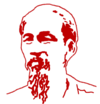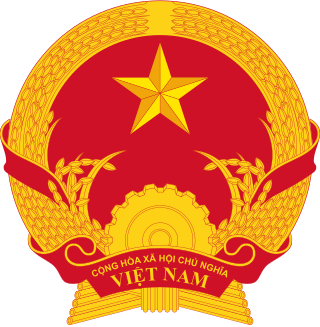
The politics of Vietnam is dominated by a single party under an authoritarian system, the Communist Party of Vietnam (CPV). The President of Vietnam is the head of state, and the Prime Minister of Vietnam is the head of government, both of these are separate from the General Secretary of the Communist Party of Vietnam who leads the CPV and is head of the Politburo and the Central Military Commission, thus the General Secretary is the de facto supreme leader of Vietnam. Executive power is exercised by the government and the President of Vietnam. Legislative power is vested in the National Assembly of Vietnam. The Judiciary is independent of the executive. The parliament adopted the current Constitution of Vietnam, its fifth, on 28 November 2013.

Hồ Chí Minh, colloqually known as Uncle Ho or just the Uncle (Bác), and by other aliases and sobriquets, was a Vietnamese communist revolutionary, nationalist, and politician. He served as Prime Minister of the Democratic Republic of Vietnam from 1945 to 1955, and as President from 1945 until his death in 1969. Ideologically a Marxist–Leninist, he was the Chairman and First Secretary of the Workers' Party of Vietnam, the predecessor of the current Communist Party of Vietnam.

The Viet Cong was a communist movement and united front organization in South Vietnam, Laos and Cambodia. Formally organized as the National Liberation Front of South Vietnam, it fought under the direction of North Vietnam against the South Vietnamese and United States governments during the Vietnam War. The organization had both guerrilla and regular army units, as well as a network of cadres who organized and mobilized peasants in the territory the Viet Cong controlled. During the war, communist fighters and some anti-war activists claimed that the Viet Cong was an insurgency indigenous to the South, while the U.S. and South Vietnamese governments portrayed the group as a tool of North Vietnam. According to Trần Văn Trà, the Viet Cong's top commander, and the post-war Vietnamese government's official history, the Viet Cong followed orders from Hanoi and were practically part of the People's Army of Vietnam, or North Vietnamese army.

Phạm Văn Đồng was a Vietnamese politician who served as Prime Minister of North Vietnam from 1955 to 1976. He later served as Prime Minister of Vietnam following reunification of North and South Vietnam from 1976 until he retired in 1987 under the rule of Lê Duẩn and Nguyễn Văn Linh. He was considered one of Hồ Chí Minh's closest lieutenants.
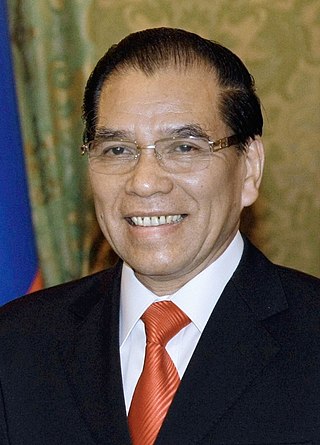
Nông Đức Mạnh is a Vietnamese politician who served as General Secretary of the Communist Party of Vietnam, the most powerful position in the Socialist Republic of Vietnam, from 22 April 2001 to 19 January 2011. His parents were Tày peasants. Nông Đức Mạnh was born in Cường Lợi, Na Rì District, Bắc Kạn Province. His own son is Nông Quốc Tuấn, party secretary for Bắc Giang Province.

The Communist Party of Vietnam (CPV), also known as the Vietnamese Communist Party (VCP), is the founding and sole legal party of the Socialist Republic of Vietnam. Founded in 1930 by Hồ Chí Minh, the CPV became the ruling party of North Vietnam in 1954 and then all of Vietnam after the collapse of the South Vietnamese government following the Fall of Saigon in 1975. Although it nominally exists alongside the Vietnamese Fatherland Front, it maintains a unitary government and has centralized control over the state, military, and media. The supremacy of the CPV is guaranteed by Article 4 of the national constitution. The Vietnamese public generally refer to the CPV as simply "the Party" or "our Party".

The national flag of Vietnam, formally the National Flag of the Socialist Republic of Vietnam, locally recognized as cờ đỏ sao vàng and also cờ Tổ quốc, was designed in 1940 and used during an uprising against the French in southern Vietnam that year. The red background symbolizes revolution and bloodshed. The golden star represents the five main classes in Vietnamese society—intellectuals, farmers, workers, entrepreneurs, and soldiers.

The president of the Socialist Republic of Vietnam is the head of state of Vietnam, elected by the Vietnam National Assembly from delegates of the National Assembly. Since Vietnam is a single-party state, the president is generally considered to hold the second highest position in the political system, formally after the general secretary of the Communist Party of Vietnam. In addition, the president appoints the head of government, the prime minister. As head of state, the President represents Vietnam both domestically and internationally, and maintains the regular and coordinated operation and stability of the national government and safeguards the independence and territorial integrity of the country.
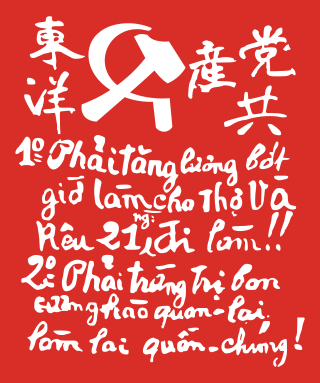
The Indochinese Communist Party (ICP) was a political party which was transformed from the old Vietnamese Communist Party in October 1930. This party dissolved itself on 11 November 1945.
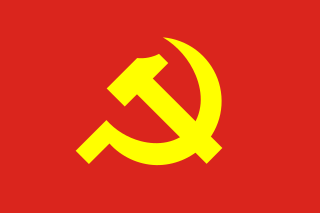
The general secretary of the Communist Party of Vietnam Central Committee, less formally the party general secretary or simply the general secretary, is the holder of the highest office within the Communist Party of Vietnam and practically being the foremost political figure in Vietnam. The general secretaryship used to be the second-highest office within the party when Hồ Chí Minh was the chairman, a post which existed from 1951 to 1969, and since 1969, the general secretary has generally been regarded as the de facto leader of Vietnam. The general secretary also holds the title of the secretary of the Central Military Commission, the leading party organ on military affairs. The current general secretary is Nguyễn Phú Trọng, ranking first in the Politburo. The position was once designated the first secretary from 1951 to 1976.

The Ho Chi Minh Museum is located in Hanoi, Vietnam. Constructed in the 1990s, it is dedicated to the late Vietnamese leader Ho Chi Minh and Vietnam's revolutionary struggle against foreign powers.

North Vietnam, officially the Democratic Republic of Vietnam, was a socialist state in Southeast Asia that existed from 1945 to 1976, with formal sovereignty being fully recognized in 1954. A member of the Eastern Bloc, it opposed the French-backed State of Vietnam and later the Western-allied Republic of Vietnam. North Vietnam emerged victorious over South Vietnam in 1975 and ceased to exist the following year when it unified with the south to become the current Socialist Republic of Vietnam.

The 1945–46 War in Vietnam, codenamed Operation Masterdom by the British, and also known as the Southern Resistance War by the Vietnamese, was a post–World War II armed conflict involving a largely British-Indian and French task force and Japanese troops from the Southern Expeditionary Army Group, versus the Vietnamese communist movement, the Viet Minh, for control of the southern half of the country, after the unconditional Japanese surrender.

Trương Tấn Sang is a Vietnamese politician, who served as the seventh President of Vietnam from 2011 to 2016. He was one of Vietnam's top leaders, alongside prime minister Nguyễn Tấn Dũng and Party general secretary Nguyễn Phú Trọng. In July 2011, Trương Tấn Sang was elected state president of the Socialist Republic of Vietnam by the National Assembly of Vietnam and nominated by his predecessor Nguyễn Minh Triết who retired from office.
Ho Chi Minh Thought is a political philosophy that builds upon Marxism–Leninism and the ideology of Vietnamese revolutionary Ho Chi Minh. It was developed and codified by the Communist Party of Vietnam and formalised in 1991. The term is used to cover political theories and policies considered as representing a form of Marxism–Leninism that has been adapted to Vietnamese circumstances and history. The ideology includes views on the basic issues of the Vietnamese Revolution, specifically the development and application of Marxism–Leninism to the material conditions of Vietnam.

1940—1946 in French Indochina focuses on events that happened in French Indochina during and after World War II and which influenced the eventual decision for military intervention by the United States in the Vietnam War. French Indochina in the 1940s was divided into four protectorates and one colony (Cochinchina). The latter three territorial divisions made up Vietnam. In 1940, the French controlled 23 million Vietnamese with 12,000 French soldiers, about 40,000 Vietnamese soldiers, and the Sûreté, a powerful police force. At that time, the U.S. had little interest in Vietnam or French Indochina as a whole. Fewer than 100 Americans, mostly missionaries, lived in Vietnam and U.S. government representation consisted of one consul resident in Saigon.
Socialism in Vietnam, in particular Marxism–Leninism, is the ideological foundation of the Communist Party of Vietnam (CPV) for the development of the country ever since its establishment.
The Ho Chi Minh monument is a monument located in Akademichesky District, Moscow. It memorializes North Vietnamese president Ho Chi Minh, who was the chairman and founder of the Workers' Party of Vietnam. The monument was inaugurated on May 18, 1990, on the eve of Ho Chi Minh's 100th birthday.

Võ Văn Thưởng is a Vietnamese politician serving as the President of Vietnam since 2023, being the youngest person to serve in this position since the country's reunification. As the country's head of state, Thưởng is the second highest official in Vietnam after Nguyễn Phú Trọng, the general secretary of the Communist Party of Vietnam.


















